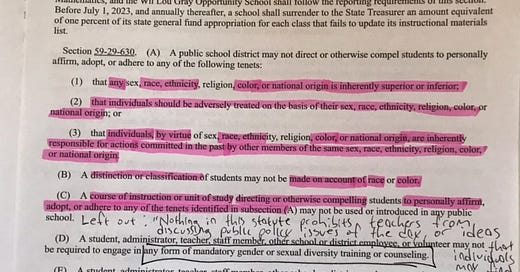Let’s begin by saying that we are living through a very dangerous time. Everyone in this room is in one way or another aware of that… So any citizen of this country who figures himself as responsible — and particularly those of you who deal with the minds and hearts of young people — must be prepared to “go for broke.” Or to put it another way, you must understand that in the attempt to correct so many generations of bad faith and cruelty, when it is operating not only in the classroom but in society, you will meet the most fantastic, the most brutal, and the most determined resistance. There is no point in pretending that this won’t happen.
-James Baldwin, “A Talk to Teachers” (1963)
As reported by The State’s Zak Koeske, new SC House Education and Public Works Chair Shannon Erickson has announced that she is interested in again taking up the bill voted through by the committee last session— or, at least, by the white, Republican members of the committee; as Democrat Annie McDaniel po…
Keep reading with a 7-day free trial
Subscribe to Other Duties (as assigned) to keep reading this post and get 7 days of free access to the full post archives.



